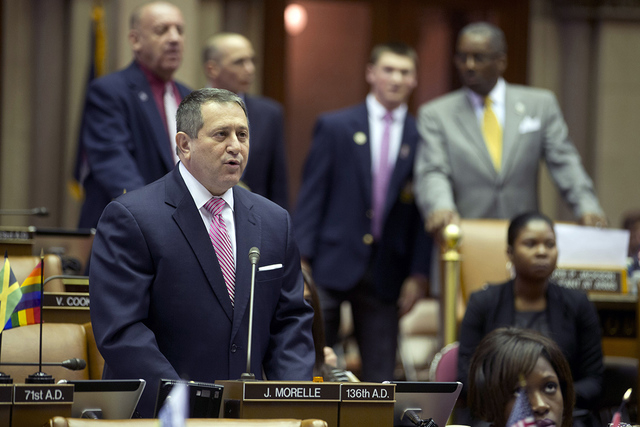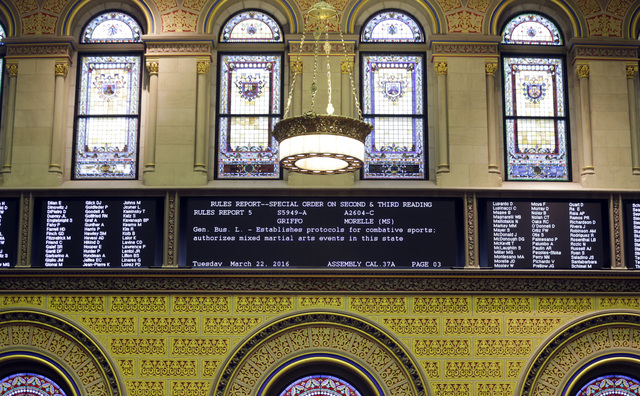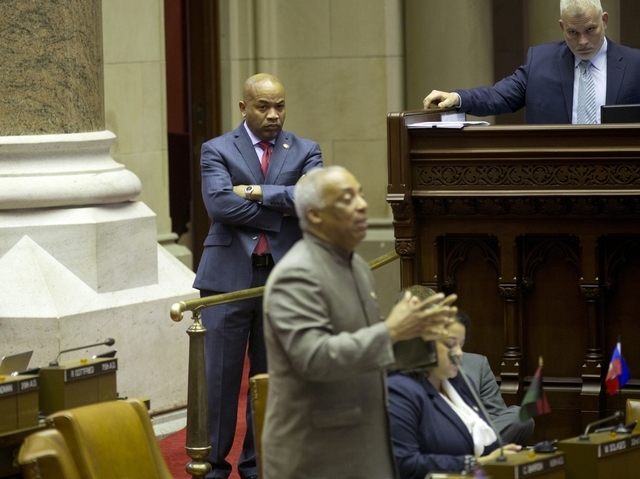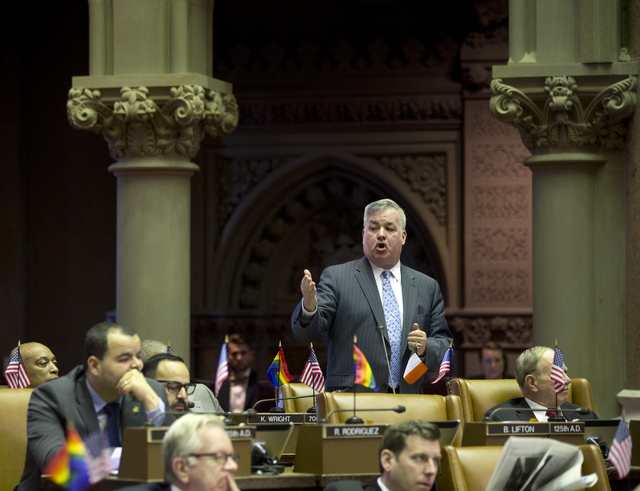New York lawmakers’ decision to sanction MMA was long, painful process
One of the first times Marc Ratner ever publicly discussed mixed martial arts was an infamous “Larry King Live” interview in 1997 when the then-executive director of the Nevada Athletic Commission said he couldn’t picture the sport ever being sanctioned in the state.
Less than a decade later, Ratner was working for the sport’s largest organization. Among his primary duties for the Ultimate Fighting Championship was to help lead a push to make sure the sport was regulated everywhere.
A 113-25 vote in the New York State Assembly last week essentially cleared the way for the final holdout in the United States to sanction the sport.
It was the culmination of more than eight years of work by Ratner and other UFC executives to finally get the bill passed. Once Gov. Andrew Cuomo signs it, the state athletic commission has 120 days to adopt the rules and approve regulations as a sanctioning body and it’s game on for professional events in New York, the last state with a law on the books preventing professional MMA events.
Ratner seemed an unlikely advocate in the early days, but it was far more than just a change of attitude that changed his tune.
“At that time, the advertising was, ‘No holds barred, anything goes.’ I publicly said you can’t have a sport with no rules and I had to come out against it. But once the unified rules came into play in late 2000 and early 2001, then the state of Nevada was able to approve the sport,” Ratner said, reflecting on his comments to King nearly 20 years ago. “What I said then was it wasn’t a sport. With our commission once they put the unified rules in, it was very simple to get it approved. Then it was a sport. I never worried about (those comments being brought up during the legislative battle in New York).
“I’m seeing the video of it from back then. I had dark hair. I looked better then.”
It has been a stressful process. Professional MMA events took place in New York in the sport’s early days, including UFC 7 in Buffalo in 1995. It was banned in 1997 when then-Gov. George Pataki pushed through a law to outlaw any further events, though a loophole did still allow amateur shows.
The current ownership of the UFC took control in 2001, just as the modern rules were being established. Ratner was hired five years later as the push began to have the sport sanctioned not only in every state, but around the world. One by one, jurisdictions came around.
New York has long been the most contentious battlefield. The MMA bill was passed by the state’s senate each of the last seven years, only to stall in the Assembly. While the votes were always believed to be there, former speaker Sheldon Silver continuously refused to bring it to the floor.
Frustration built as the political process played out. Then Silver was charged and ultimately found guilty of corruption for unrelated matters and the path was cleared for last Tuesday’s historic vote.
“We’ve been to almost every state legislature between California and Maine and been to legislatures all throughout the world,” UFC COO Lawrence Epstein said. “New York, though it took a lot longer than any of those other jurisdictions, things were pretty much the same.
“This is really just an education process. It took us a little longer to get things done, but it’s essentially what we’ve done in every jurisdiction. Ultimately, the facts and rational arguments were the winners at the end of the day.”
The final sentence was a clear reference to some of the bizarre arguments entered into the public record by opponents of the bill. While the outcome of the vote was never in doubt, several members of the Assembly wanted to make sure their dissent was heard.
The sport was compared to everything from gay porn to police brutality to forced slave fights. One Assemblywoman even appeared to suggest opening an MMA gym would be a way for a potential sexual abuser to get hands-on with potential victims.
It was difficult for former UFC middleweight champion Chris Weidman to listen to at times, but not the first time he had heard some of the arguments.
Weidman, a Long Island native and Hofstra graduate, spent a great deal of time lobbying elected officials in Albany. He also participated in a bus tour around the state with UFC executives earlier this year to rally support for the bill.
He was tuned in to most of the hearing on a webstream before he went to the gym for practice as he prepares for a June 4 title rematch against champ Luke Rockhold.
“A lot of this stuff we might hear when we met with them in their offices and we’d be shocked. But for them to actually say it in such a public forum was very surprising and I was actually embarrassed for them,” Weidman said of some of the more preposterous comments. “It made them look ignorant and they were just reaching as far as they possibly could to stop it from happening for whatever reason and they made themselves look bad for doing it.
Weidman and his teammates, many longtime New York residents, were thrilled when practice was interrupted with news the bill had passed Tuesday evening.
“We were waiting for the decision and someone ran over with the phone while we were doing jiu-jitsu on the mats and told us it passed,” he said. “Of course, the first thing we had to do was make a social media video so everyone could see how we were feeling. But everyone was so excited whether they are doing MMA for fun or for exercise or if they’re competing as amateurs and pros, everyone is just so excited. Living in New York and having to explain to people who aren’t educated about the sport why it’s illegal is something everyone was sick of doing all the time. To know it’s legitimate now and there’s no more explaining is just a huge relief to everybody.”
Epstein and UFC CEO Lorenzo Fertitta estimated the organization spent more than $2 million lobbying for this legislation over the last eight years.
Fertitta, however, said no celebration was planned. That will come when the UFC holds its first event in the state.
According to Fertitta, the organization could hold two events in the state before the end of 2016. It’s very possible a smaller card will be held upstate in the fall with a potential mega-event at Madison Square Garden in November if all goes according to plan.
Fertitta said having mixed martial arts sanctioned in every state was an important part of the plan to grow the sport the company began when Zuffa purchased the UFC in 2001.
“We invested in the sport no differently than we’ve done over the last 15 or 16 years. It’s part of the process. You hire lobbyists, you go in and talk about what your position is and try to educate people. This process took us eight years. Finally we were able to get it done,” he said. “The biggest change was at the top with Speaker (Carl) Heastie who, whether he supported the bill or not, was willing to let the democratic process play out. The same can’t be said for the prior speaker.
“Now we can move on from what has been talked about in the past and focus on trying to put on big events.”
Epstein pointed out just how important it was to have stars like Weidman who were not only willing to give up their time to speak to elected officials on a regular basis, but could do so in a professional manner.
“We never could have got this done without the great athletes that went up and met with legislators, talked to them about their experiences,” Epstein said. “ We can go up there as executives of the company and talk all day long, but what really carried the day were guys like Chris and others who spent their time to educate legislators not just on the sport, but who are the participants. That speaks louder than anything you can present or any studies you can show.”
Weidman said his lobbying efforts were about more than wanting to fight in his home state. Regulation isn’t about putting a stamp of approval on violence.
“It’s a sport I’m doing by choice. There’s chances you’re going to get hurt. It’s the risk we take to do what we love. When it’s properly regulated like it will be now, it’s a safe sport,” he said. “One thing people are starting to get is amateur MMA was already legal in New York, which is the same rules pretty much as pros and these guys were getting hurt with no insurance, no blood testing, no brain tests. It was very unsafe.
“What happened (last Tuesday) is just another step in making this sport safer.”
While the process was eye-opening for Weidman, particularly hearing some of the uneducated opinions about his chosen profession, he prefers to move forward and look at the positives.
“It’s a great day,” he said. “It’s very exciting for this to finally happen.”
He hopes to win the belt back from Rockhold and then set to work on convincing UFC officials to allow him to headline the first card at Madison Square Garden.
Regardless of what fights end up on that card, the UFC expects it to be successful. While the lengthy process it went through will be good for the sport and the athletes, the UFC certainly had business reasons for its pursuits.
Fertitta said the goal will be to break live-gate records in each of the state’s venues in which the organization hosts events, including Madison Square Garden.
“New York is the biggest market for us in the United States already from a pay-per-view standpoint. It’s the most important media market in the United States and probably the world,” he said. “We have high expectations that when we do events at Madison Square Garden or at the arenas upstate. We think it’s going to be great for the fighters and the industry. It’s not just the UFC. We’ll see other promotions like Bellator, which is owned by Viacom, going there. You’ll also have midsize and smaller promoters. I think you’ll see a lot of economic activity in the state. I think it’s going to be a big deal.”
Now that the sport is nearly legal in New York, it will probably mean Ratner will spend a whole lot less time in the Empire State.
He has been to Albany over 20 times over the last seven years and can offer advice on all the business hotels and breakfast spots.
Ratner will still have business to conduct as the athletic commission looks to formally adopt the rules and regulations, but the journey is nearing completion.
“I think it was just about education and talking to these people over and over, enough to finally realize that it is a sport and it is regulated. All of our trips up there and these road trips and certainly brining the fighters up there was such a big thing. Chris did a fabulous job. It was just a combination of everything, but it was very exhilarating,” the one-time critic said. “It was well worth it. Time to look forward to our first shows. I’m excited.”
Only some of that enthusiasm can be directly attributed to spending less time in Albany.
Contact reporter Adam Hill at ahill@reviewjournal.com or 702-224-5509. Follow him on Twitter: @adamhilllvrj
RELATED:
New York lawmakers vote to finally legalize MMA































